Holmes Institute: Managerial Accounting Report, Term 2, 2019
VerifiedAdded on 2022/11/01
|9
|2998
|367
Report
AI Summary
This report analyzes the application of managerial accounting systems (MAS) in multinational organizations for internal decision-making and control. It explores various MAS techniques like Activity Based Costing (ABC), Standard Costing, and Benchmarking, and their relevance in contemporary business environments. The report evaluates two case studies, focusing on how companies implement and utilize MAS for effective decision-making. The findings highlight the importance of MAS in providing timely and relevant information to managers at all levels, especially in today's dynamic global market. The report also compares the case studies with a journal article discussing the development and implementation challenges of MAS, emphasizing the need for patience and adaptability during implementation. Specific outcomes and lessons from the case studies are provided for management accountants, underscoring the practical implications of MAS in enhancing business performance and achieving organizational goals.
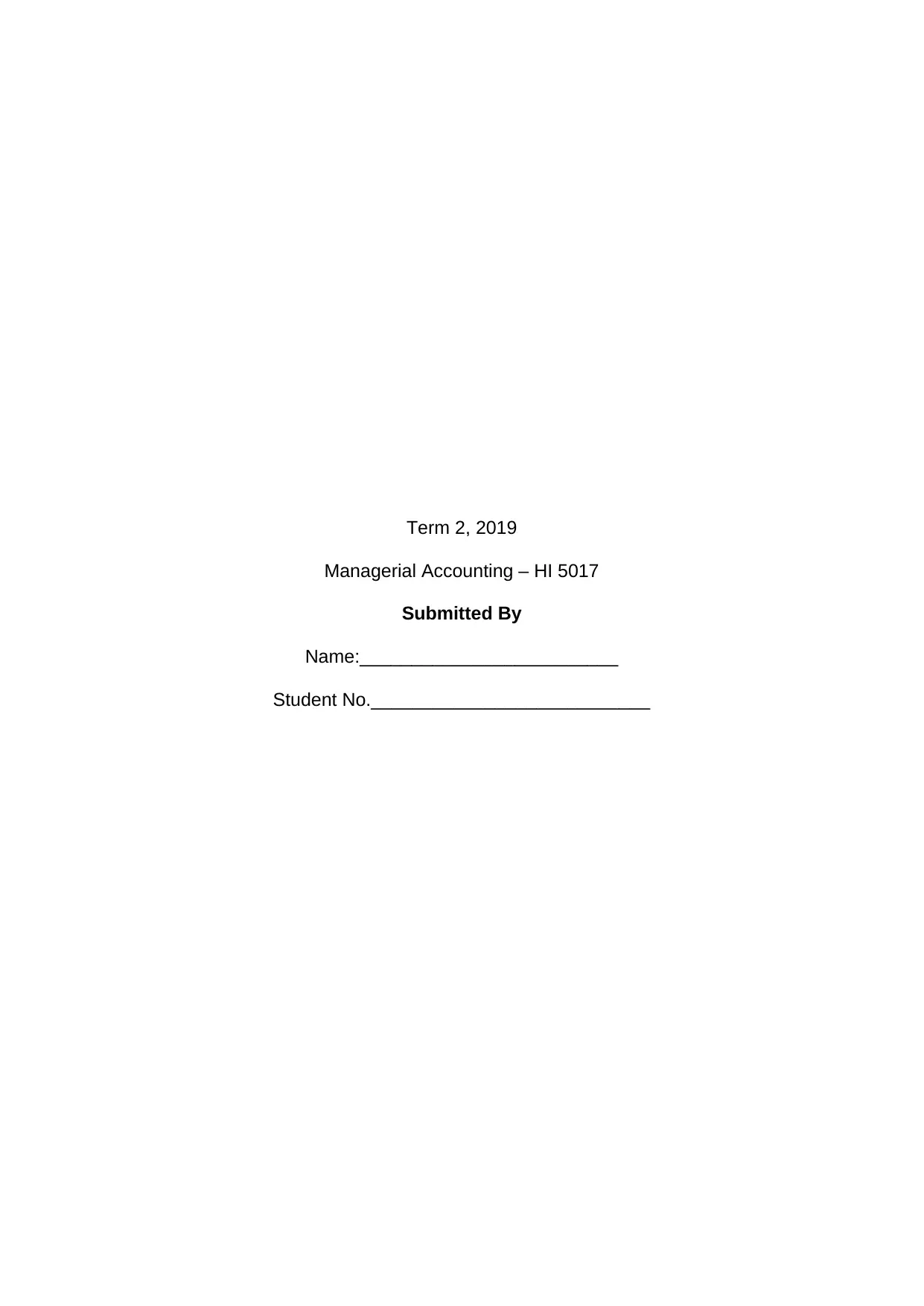
Term 2, 2019
Managerial Accounting – HI 5017
Submitted By
Name:_________________________
Student No.___________________________
Managerial Accounting – HI 5017
Submitted By
Name:_________________________
Student No.___________________________
Paraphrase This Document
Need a fresh take? Get an instant paraphrase of this document with our AI Paraphraser
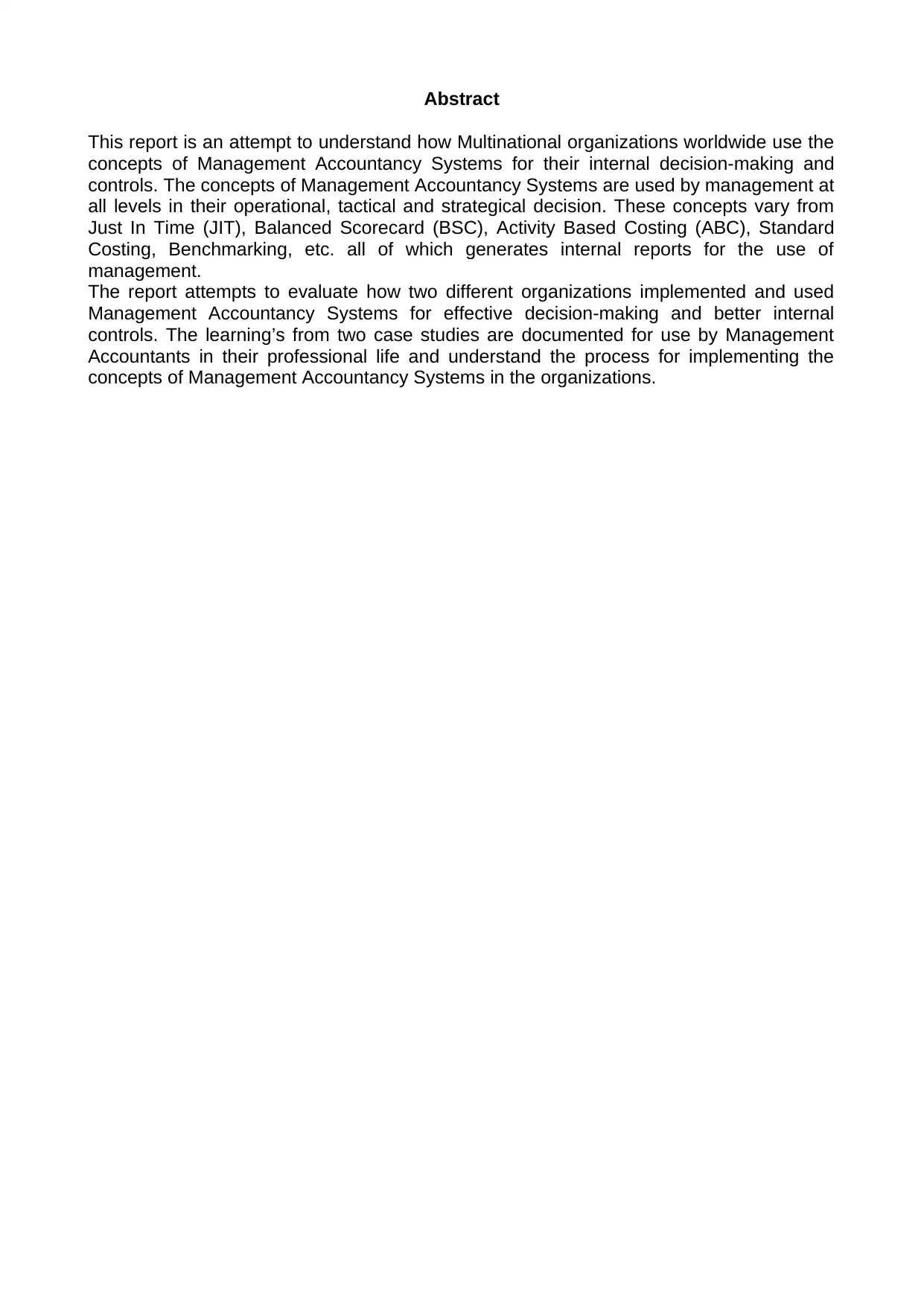
Abstract
This report is an attempt to understand how Multinational organizations worldwide use the
concepts of Management Accountancy Systems for their internal decision-making and
controls. The concepts of Management Accountancy Systems are used by management at
all levels in their operational, tactical and strategical decision. These concepts vary from
Just In Time (JIT), Balanced Scorecard (BSC), Activity Based Costing (ABC), Standard
Costing, Benchmarking, etc. all of which generates internal reports for the use of
management.
The report attempts to evaluate how two different organizations implemented and used
Management Accountancy Systems for effective decision-making and better internal
controls. The learning’s from two case studies are documented for use by Management
Accountants in their professional life and understand the process for implementing the
concepts of Management Accountancy Systems in the organizations.
This report is an attempt to understand how Multinational organizations worldwide use the
concepts of Management Accountancy Systems for their internal decision-making and
controls. The concepts of Management Accountancy Systems are used by management at
all levels in their operational, tactical and strategical decision. These concepts vary from
Just In Time (JIT), Balanced Scorecard (BSC), Activity Based Costing (ABC), Standard
Costing, Benchmarking, etc. all of which generates internal reports for the use of
management.
The report attempts to evaluate how two different organizations implemented and used
Management Accountancy Systems for effective decision-making and better internal
controls. The learning’s from two case studies are documented for use by Management
Accountants in their professional life and understand the process for implementing the
concepts of Management Accountancy Systems in the organizations.
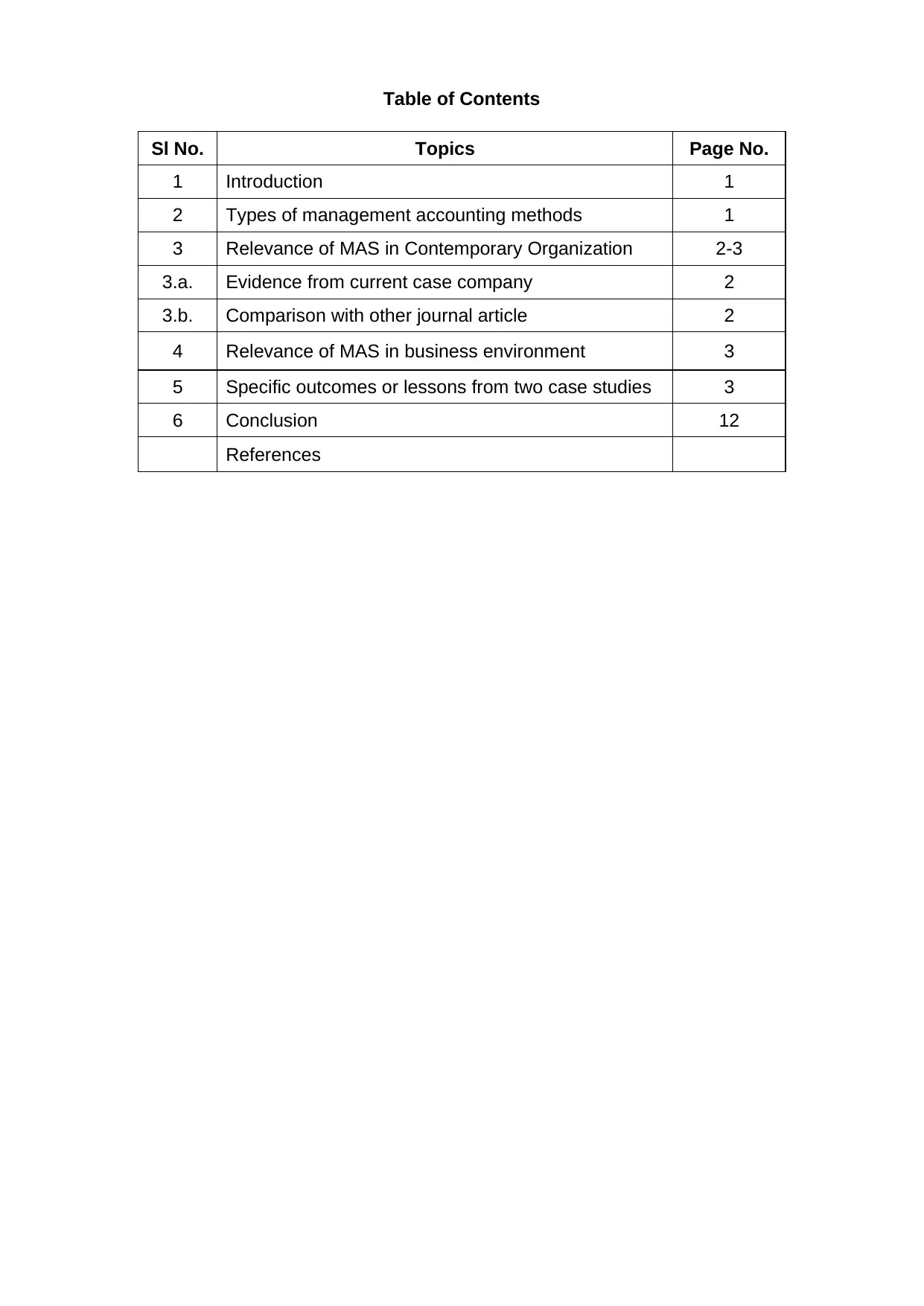
Table of Contents
Sl No. Topics Page No.
1 Introduction 1
2 Types of management accounting methods 1
3 Relevance of MAS in Contemporary Organization 2-3
3.a. Evidence from current case company 2
3.b. Comparison with other journal article 2
4 Relevance of MAS in business environment 3
5 Specific outcomes or lessons from two case studies 3
6 Conclusion 12
References
Sl No. Topics Page No.
1 Introduction 1
2 Types of management accounting methods 1
3 Relevance of MAS in Contemporary Organization 2-3
3.a. Evidence from current case company 2
3.b. Comparison with other journal article 2
4 Relevance of MAS in business environment 3
5 Specific outcomes or lessons from two case studies 3
6 Conclusion 12
References
⊘ This is a preview!⊘
Do you want full access?
Subscribe today to unlock all pages.

Trusted by 1+ million students worldwide
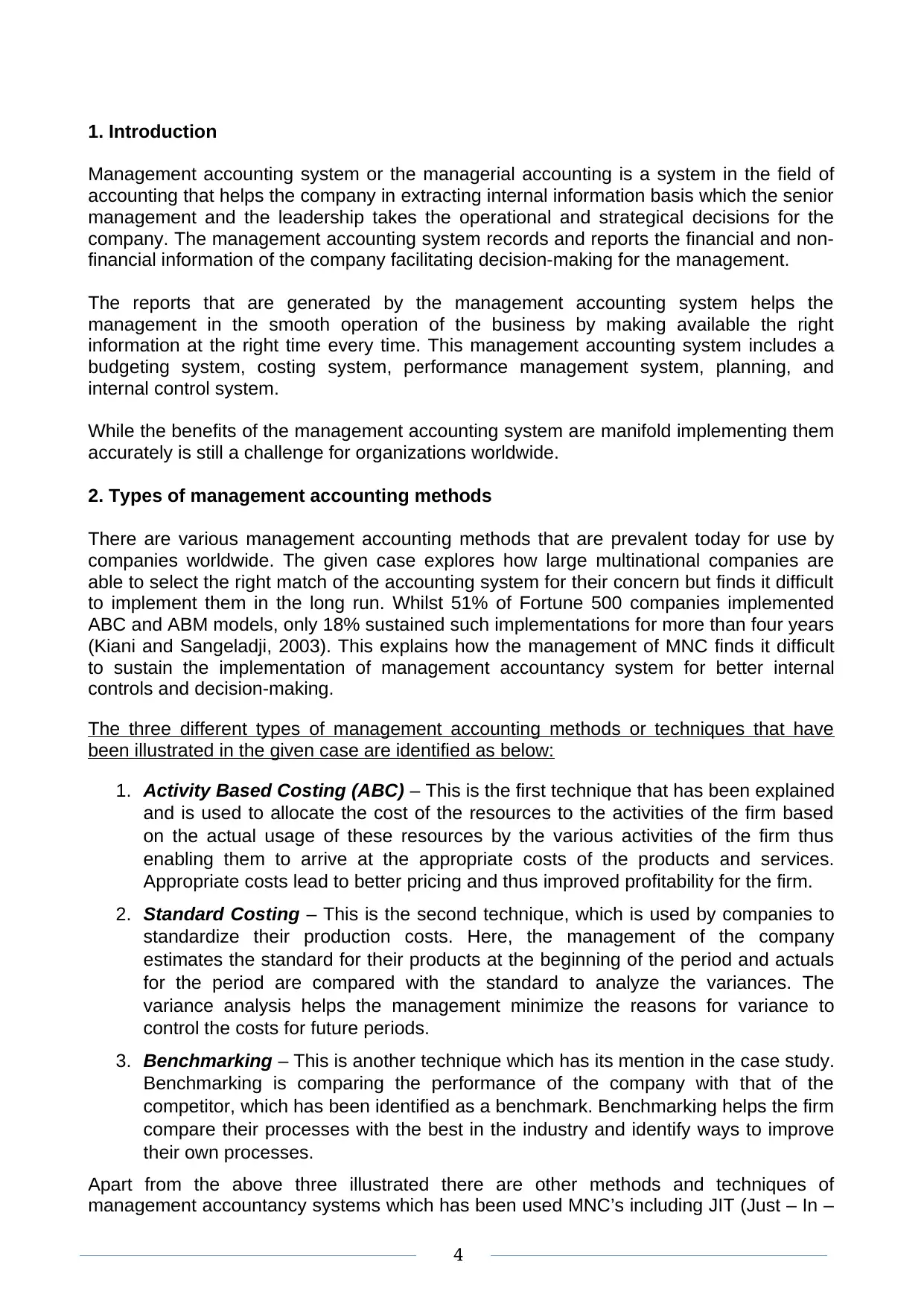
1. Introduction
Management accounting system or the managerial accounting is a system in the field of
accounting that helps the company in extracting internal information basis which the senior
management and the leadership takes the operational and strategical decisions for the
company. The management accounting system records and reports the financial and non-
financial information of the company facilitating decision-making for the management.
The reports that are generated by the management accounting system helps the
management in the smooth operation of the business by making available the right
information at the right time every time. This management accounting system includes a
budgeting system, costing system, performance management system, planning, and
internal control system.
While the benefits of the management accounting system are manifold implementing them
accurately is still a challenge for organizations worldwide.
2. Types of management accounting methods
There are various management accounting methods that are prevalent today for use by
companies worldwide. The given case explores how large multinational companies are
able to select the right match of the accounting system for their concern but finds it difficult
to implement them in the long run. Whilst 51% of Fortune 500 companies implemented
ABC and ABM models, only 18% sustained such implementations for more than four years
(Kiani and Sangeladji, 2003). This explains how the management of MNC finds it difficult
to sustain the implementation of management accountancy system for better internal
controls and decision-making.
The three different types of management accounting methods or techniques that have
been illustrated in the given case are identified as below:
1. Activity Based Costing (ABC) – This is the first technique that has been explained
and is used to allocate the cost of the resources to the activities of the firm based
on the actual usage of these resources by the various activities of the firm thus
enabling them to arrive at the appropriate costs of the products and services.
Appropriate costs lead to better pricing and thus improved profitability for the firm.
2. Standard Costing – This is the second technique, which is used by companies to
standardize their production costs. Here, the management of the company
estimates the standard for their products at the beginning of the period and actuals
for the period are compared with the standard to analyze the variances. The
variance analysis helps the management minimize the reasons for variance to
control the costs for future periods.
3. Benchmarking – This is another technique which has its mention in the case study.
Benchmarking is comparing the performance of the company with that of the
competitor, which has been identified as a benchmark. Benchmarking helps the firm
compare their processes with the best in the industry and identify ways to improve
their own processes.
Apart from the above three illustrated there are other methods and techniques of
management accountancy systems which has been used MNC’s including JIT (Just – In –
4
Management accounting system or the managerial accounting is a system in the field of
accounting that helps the company in extracting internal information basis which the senior
management and the leadership takes the operational and strategical decisions for the
company. The management accounting system records and reports the financial and non-
financial information of the company facilitating decision-making for the management.
The reports that are generated by the management accounting system helps the
management in the smooth operation of the business by making available the right
information at the right time every time. This management accounting system includes a
budgeting system, costing system, performance management system, planning, and
internal control system.
While the benefits of the management accounting system are manifold implementing them
accurately is still a challenge for organizations worldwide.
2. Types of management accounting methods
There are various management accounting methods that are prevalent today for use by
companies worldwide. The given case explores how large multinational companies are
able to select the right match of the accounting system for their concern but finds it difficult
to implement them in the long run. Whilst 51% of Fortune 500 companies implemented
ABC and ABM models, only 18% sustained such implementations for more than four years
(Kiani and Sangeladji, 2003). This explains how the management of MNC finds it difficult
to sustain the implementation of management accountancy system for better internal
controls and decision-making.
The three different types of management accounting methods or techniques that have
been illustrated in the given case are identified as below:
1. Activity Based Costing (ABC) – This is the first technique that has been explained
and is used to allocate the cost of the resources to the activities of the firm based
on the actual usage of these resources by the various activities of the firm thus
enabling them to arrive at the appropriate costs of the products and services.
Appropriate costs lead to better pricing and thus improved profitability for the firm.
2. Standard Costing – This is the second technique, which is used by companies to
standardize their production costs. Here, the management of the company
estimates the standard for their products at the beginning of the period and actuals
for the period are compared with the standard to analyze the variances. The
variance analysis helps the management minimize the reasons for variance to
control the costs for future periods.
3. Benchmarking – This is another technique which has its mention in the case study.
Benchmarking is comparing the performance of the company with that of the
competitor, which has been identified as a benchmark. Benchmarking helps the firm
compare their processes with the best in the industry and identify ways to improve
their own processes.
Apart from the above three illustrated there are other methods and techniques of
management accountancy systems which has been used MNC’s including JIT (Just – In –
4
Paraphrase This Document
Need a fresh take? Get an instant paraphrase of this document with our AI Paraphraser
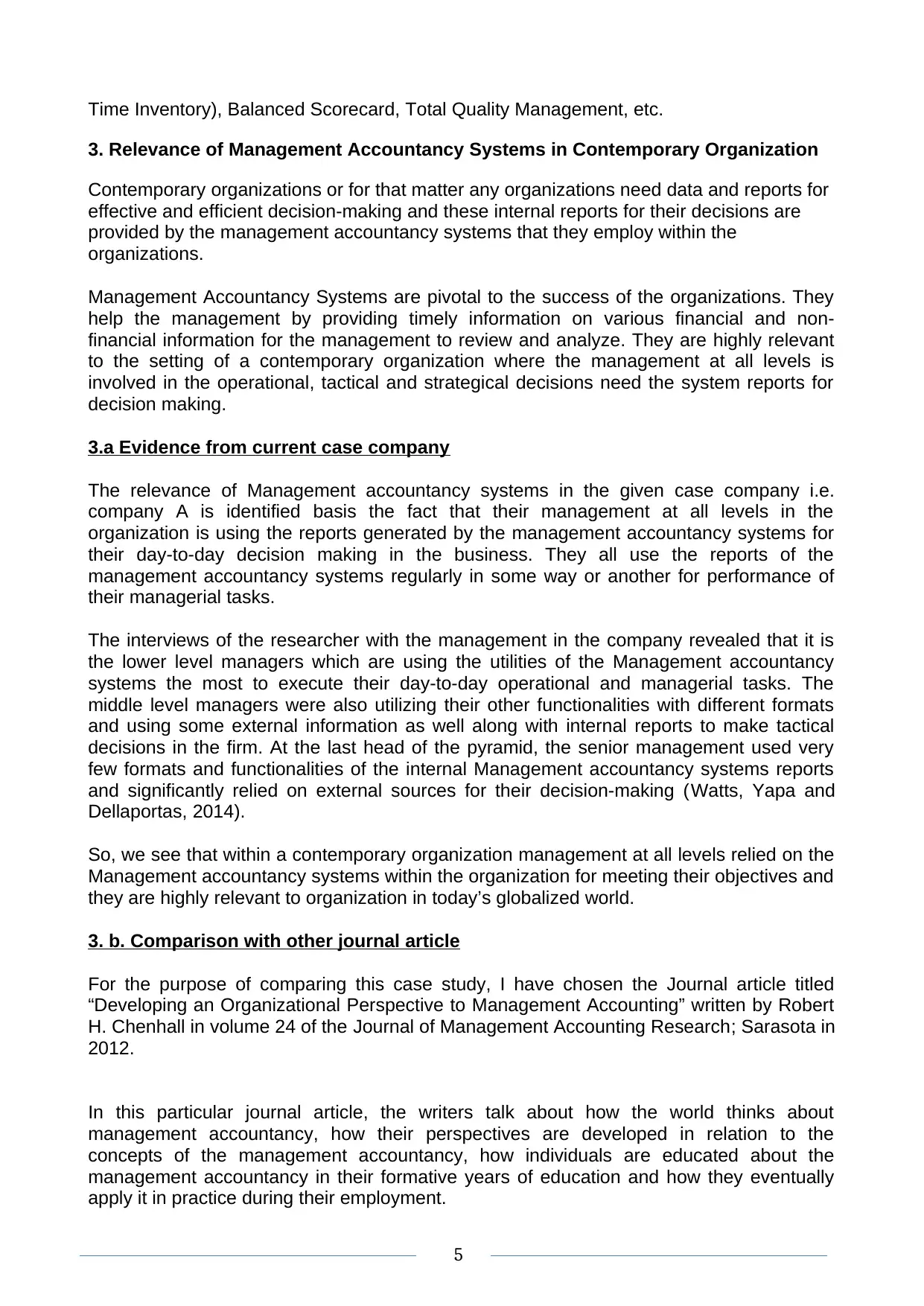
Time Inventory), Balanced Scorecard, Total Quality Management, etc.
3. Relevance of Management Accountancy Systems in Contemporary Organization
Contemporary organizations or for that matter any organizations need data and reports for
effective and efficient decision-making and these internal reports for their decisions are
provided by the management accountancy systems that they employ within the
organizations.
Management Accountancy Systems are pivotal to the success of the organizations. They
help the management by providing timely information on various financial and non-
financial information for the management to review and analyze. They are highly relevant
to the setting of a contemporary organization where the management at all levels is
involved in the operational, tactical and strategical decisions need the system reports for
decision making.
3.a Evidence from current case company
The relevance of Management accountancy systems in the given case company i.e.
company A is identified basis the fact that their management at all levels in the
organization is using the reports generated by the management accountancy systems for
their day-to-day decision making in the business. They all use the reports of the
management accountancy systems regularly in some way or another for performance of
their managerial tasks.
The interviews of the researcher with the management in the company revealed that it is
the lower level managers which are using the utilities of the Management accountancy
systems the most to execute their day-to-day operational and managerial tasks. The
middle level managers were also utilizing their other functionalities with different formats
and using some external information as well along with internal reports to make tactical
decisions in the firm. At the last head of the pyramid, the senior management used very
few formats and functionalities of the internal Management accountancy systems reports
and significantly relied on external sources for their decision-making (Watts, Yapa and
Dellaportas, 2014).
So, we see that within a contemporary organization management at all levels relied on the
Management accountancy systems within the organization for meeting their objectives and
they are highly relevant to organization in today’s globalized world.
3. b. Comparison with other journal article
For the purpose of comparing this case study, I have chosen the Journal article titled
“Developing an Organizational Perspective to Management Accounting” written by Robert
H. Chenhall in volume 24 of the Journal of Management Accounting Research; Sarasota in
2012.
In this particular journal article, the writers talk about how the world thinks about
management accountancy, how their perspectives are developed in relation to the
concepts of the management accountancy, how individuals are educated about the
management accountancy in their formative years of education and how they eventually
apply it in practice during their employment.
5
3. Relevance of Management Accountancy Systems in Contemporary Organization
Contemporary organizations or for that matter any organizations need data and reports for
effective and efficient decision-making and these internal reports for their decisions are
provided by the management accountancy systems that they employ within the
organizations.
Management Accountancy Systems are pivotal to the success of the organizations. They
help the management by providing timely information on various financial and non-
financial information for the management to review and analyze. They are highly relevant
to the setting of a contemporary organization where the management at all levels is
involved in the operational, tactical and strategical decisions need the system reports for
decision making.
3.a Evidence from current case company
The relevance of Management accountancy systems in the given case company i.e.
company A is identified basis the fact that their management at all levels in the
organization is using the reports generated by the management accountancy systems for
their day-to-day decision making in the business. They all use the reports of the
management accountancy systems regularly in some way or another for performance of
their managerial tasks.
The interviews of the researcher with the management in the company revealed that it is
the lower level managers which are using the utilities of the Management accountancy
systems the most to execute their day-to-day operational and managerial tasks. The
middle level managers were also utilizing their other functionalities with different formats
and using some external information as well along with internal reports to make tactical
decisions in the firm. At the last head of the pyramid, the senior management used very
few formats and functionalities of the internal Management accountancy systems reports
and significantly relied on external sources for their decision-making (Watts, Yapa and
Dellaportas, 2014).
So, we see that within a contemporary organization management at all levels relied on the
Management accountancy systems within the organization for meeting their objectives and
they are highly relevant to organization in today’s globalized world.
3. b. Comparison with other journal article
For the purpose of comparing this case study, I have chosen the Journal article titled
“Developing an Organizational Perspective to Management Accounting” written by Robert
H. Chenhall in volume 24 of the Journal of Management Accounting Research; Sarasota in
2012.
In this particular journal article, the writers talk about how the world thinks about
management accountancy, how their perspectives are developed in relation to the
concepts of the management accountancy, how individuals are educated about the
management accountancy in their formative years of education and how they eventually
apply it in practice during their employment.
5
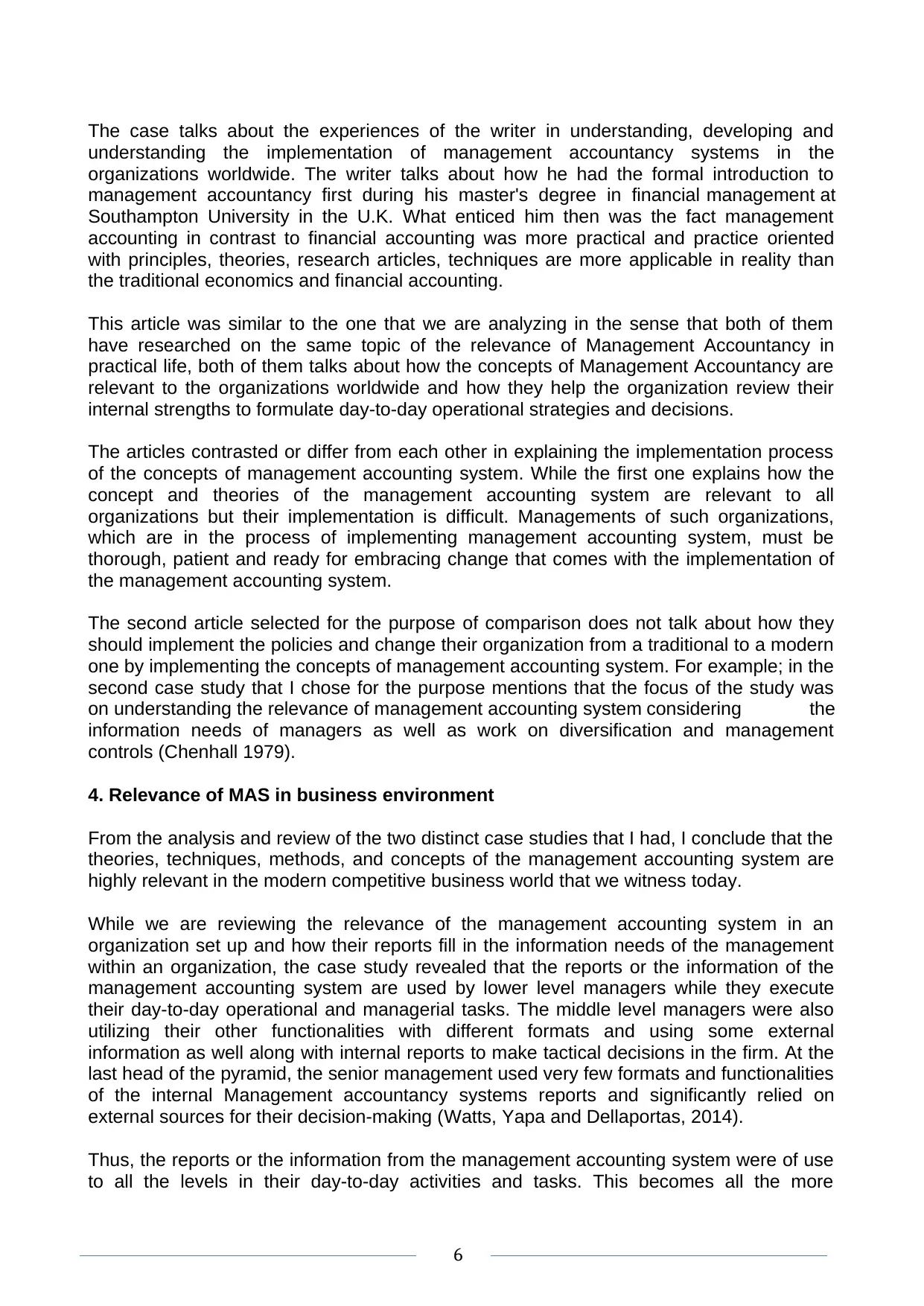
The case talks about the experiences of the writer in understanding, developing and
understanding the implementation of management accountancy systems in the
organizations worldwide. The writer talks about how he had the formal introduction to
management accountancy first during his master's degree in financial management at
Southampton University in the U.K. What enticed him then was the fact management
accounting in contrast to financial accounting was more practical and practice oriented
with principles, theories, research articles, techniques are more applicable in reality than
the traditional economics and financial accounting.
This article was similar to the one that we are analyzing in the sense that both of them
have researched on the same topic of the relevance of Management Accountancy in
practical life, both of them talks about how the concepts of Management Accountancy are
relevant to the organizations worldwide and how they help the organization review their
internal strengths to formulate day-to-day operational strategies and decisions.
The articles contrasted or differ from each other in explaining the implementation process
of the concepts of management accounting system. While the first one explains how the
concept and theories of the management accounting system are relevant to all
organizations but their implementation is difficult. Managements of such organizations,
which are in the process of implementing management accounting system, must be
thorough, patient and ready for embracing change that comes with the implementation of
the management accounting system.
The second article selected for the purpose of comparison does not talk about how they
should implement the policies and change their organization from a traditional to a modern
one by implementing the concepts of management accounting system. For example; in the
second case study that I chose for the purpose mentions that the focus of the study was
on understanding the relevance of management accounting system considering the
information needs of managers as well as work on diversification and management
controls (Chenhall 1979).
4. Relevance of MAS in business environment
From the analysis and review of the two distinct case studies that I had, I conclude that the
theories, techniques, methods, and concepts of the management accounting system are
highly relevant in the modern competitive business world that we witness today.
While we are reviewing the relevance of the management accounting system in an
organization set up and how their reports fill in the information needs of the management
within an organization, the case study revealed that the reports or the information of the
management accounting system are used by lower level managers while they execute
their day-to-day operational and managerial tasks. The middle level managers were also
utilizing their other functionalities with different formats and using some external
information as well along with internal reports to make tactical decisions in the firm. At the
last head of the pyramid, the senior management used very few formats and functionalities
of the internal Management accountancy systems reports and significantly relied on
external sources for their decision-making (Watts, Yapa and Dellaportas, 2014).
Thus, the reports or the information from the management accounting system were of use
to all the levels in their day-to-day activities and tasks. This becomes all the more
6
understanding the implementation of management accountancy systems in the
organizations worldwide. The writer talks about how he had the formal introduction to
management accountancy first during his master's degree in financial management at
Southampton University in the U.K. What enticed him then was the fact management
accounting in contrast to financial accounting was more practical and practice oriented
with principles, theories, research articles, techniques are more applicable in reality than
the traditional economics and financial accounting.
This article was similar to the one that we are analyzing in the sense that both of them
have researched on the same topic of the relevance of Management Accountancy in
practical life, both of them talks about how the concepts of Management Accountancy are
relevant to the organizations worldwide and how they help the organization review their
internal strengths to formulate day-to-day operational strategies and decisions.
The articles contrasted or differ from each other in explaining the implementation process
of the concepts of management accounting system. While the first one explains how the
concept and theories of the management accounting system are relevant to all
organizations but their implementation is difficult. Managements of such organizations,
which are in the process of implementing management accounting system, must be
thorough, patient and ready for embracing change that comes with the implementation of
the management accounting system.
The second article selected for the purpose of comparison does not talk about how they
should implement the policies and change their organization from a traditional to a modern
one by implementing the concepts of management accounting system. For example; in the
second case study that I chose for the purpose mentions that the focus of the study was
on understanding the relevance of management accounting system considering the
information needs of managers as well as work on diversification and management
controls (Chenhall 1979).
4. Relevance of MAS in business environment
From the analysis and review of the two distinct case studies that I had, I conclude that the
theories, techniques, methods, and concepts of the management accounting system are
highly relevant in the modern competitive business world that we witness today.
While we are reviewing the relevance of the management accounting system in an
organization set up and how their reports fill in the information needs of the management
within an organization, the case study revealed that the reports or the information of the
management accounting system are used by lower level managers while they execute
their day-to-day operational and managerial tasks. The middle level managers were also
utilizing their other functionalities with different formats and using some external
information as well along with internal reports to make tactical decisions in the firm. At the
last head of the pyramid, the senior management used very few formats and functionalities
of the internal Management accountancy systems reports and significantly relied on
external sources for their decision-making (Watts, Yapa and Dellaportas, 2014).
Thus, the reports or the information from the management accounting system were of use
to all the levels in their day-to-day activities and tasks. This becomes all the more
6
⊘ This is a preview!⊘
Do you want full access?
Subscribe today to unlock all pages.

Trusted by 1+ million students worldwide
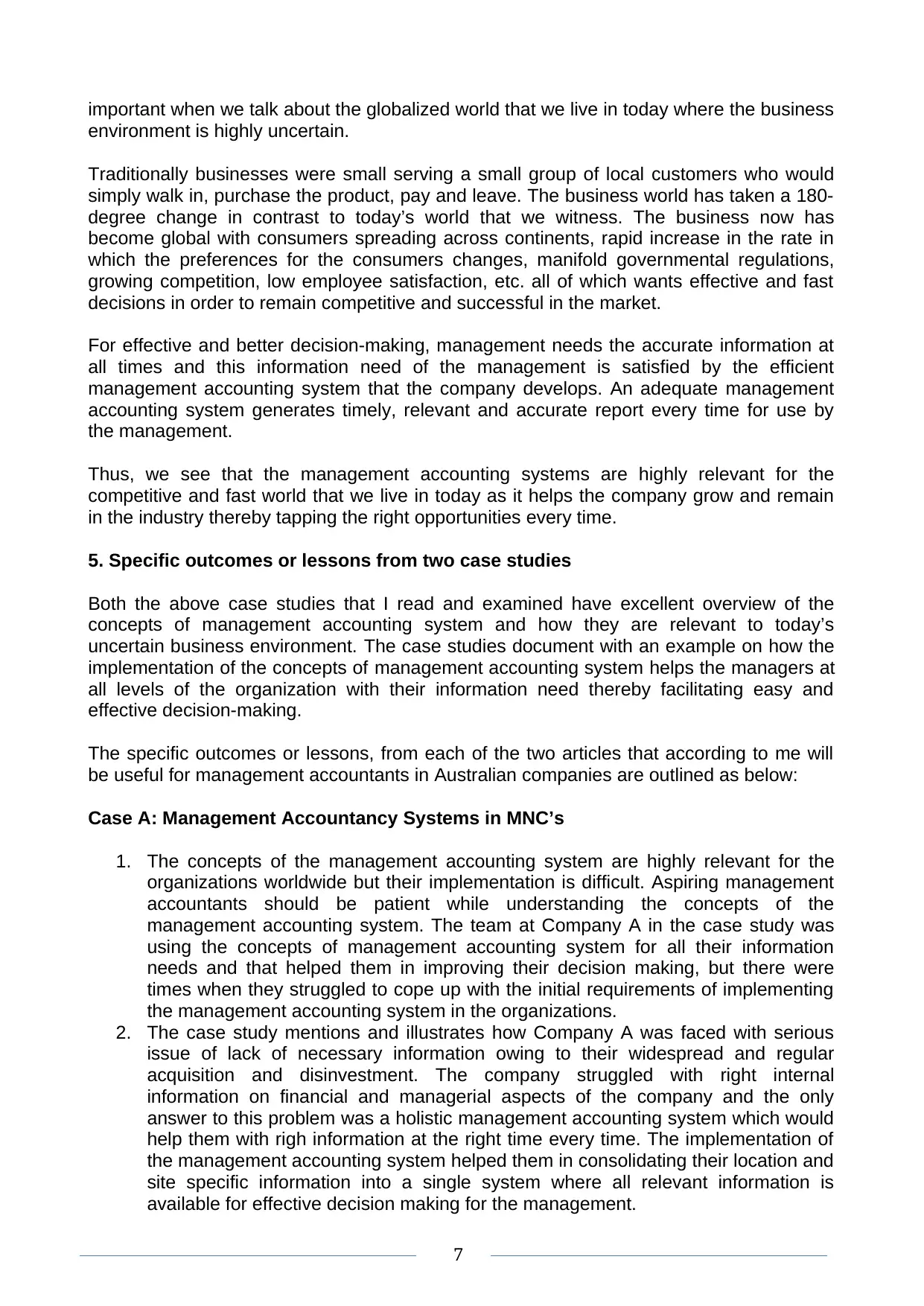
important when we talk about the globalized world that we live in today where the business
environment is highly uncertain.
Traditionally businesses were small serving a small group of local customers who would
simply walk in, purchase the product, pay and leave. The business world has taken a 180-
degree change in contrast to today’s world that we witness. The business now has
become global with consumers spreading across continents, rapid increase in the rate in
which the preferences for the consumers changes, manifold governmental regulations,
growing competition, low employee satisfaction, etc. all of which wants effective and fast
decisions in order to remain competitive and successful in the market.
For effective and better decision-making, management needs the accurate information at
all times and this information need of the management is satisfied by the efficient
management accounting system that the company develops. An adequate management
accounting system generates timely, relevant and accurate report every time for use by
the management.
Thus, we see that the management accounting systems are highly relevant for the
competitive and fast world that we live in today as it helps the company grow and remain
in the industry thereby tapping the right opportunities every time.
5. Specific outcomes or lessons from two case studies
Both the above case studies that I read and examined have excellent overview of the
concepts of management accounting system and how they are relevant to today’s
uncertain business environment. The case studies document with an example on how the
implementation of the concepts of management accounting system helps the managers at
all levels of the organization with their information need thereby facilitating easy and
effective decision-making.
The specific outcomes or lessons, from each of the two articles that according to me will
be useful for management accountants in Australian companies are outlined as below:
Case A: Management Accountancy Systems in MNC’s
1. The concepts of the management accounting system are highly relevant for the
organizations worldwide but their implementation is difficult. Aspiring management
accountants should be patient while understanding the concepts of the
management accounting system. The team at Company A in the case study was
using the concepts of management accounting system for all their information
needs and that helped them in improving their decision making, but there were
times when they struggled to cope up with the initial requirements of implementing
the management accounting system in the organizations.
2. The case study mentions and illustrates how Company A was faced with serious
issue of lack of necessary information owing to their widespread and regular
acquisition and disinvestment. The company struggled with right internal
information on financial and managerial aspects of the company and the only
answer to this problem was a holistic management accounting system which would
help them with righ information at the right time every time. The implementation of
the management accounting system helped them in consolidating their location and
site specific information into a single system where all relevant information is
available for effective decision making for the management.
7
environment is highly uncertain.
Traditionally businesses were small serving a small group of local customers who would
simply walk in, purchase the product, pay and leave. The business world has taken a 180-
degree change in contrast to today’s world that we witness. The business now has
become global with consumers spreading across continents, rapid increase in the rate in
which the preferences for the consumers changes, manifold governmental regulations,
growing competition, low employee satisfaction, etc. all of which wants effective and fast
decisions in order to remain competitive and successful in the market.
For effective and better decision-making, management needs the accurate information at
all times and this information need of the management is satisfied by the efficient
management accounting system that the company develops. An adequate management
accounting system generates timely, relevant and accurate report every time for use by
the management.
Thus, we see that the management accounting systems are highly relevant for the
competitive and fast world that we live in today as it helps the company grow and remain
in the industry thereby tapping the right opportunities every time.
5. Specific outcomes or lessons from two case studies
Both the above case studies that I read and examined have excellent overview of the
concepts of management accounting system and how they are relevant to today’s
uncertain business environment. The case studies document with an example on how the
implementation of the concepts of management accounting system helps the managers at
all levels of the organization with their information need thereby facilitating easy and
effective decision-making.
The specific outcomes or lessons, from each of the two articles that according to me will
be useful for management accountants in Australian companies are outlined as below:
Case A: Management Accountancy Systems in MNC’s
1. The concepts of the management accounting system are highly relevant for the
organizations worldwide but their implementation is difficult. Aspiring management
accountants should be patient while understanding the concepts of the
management accounting system. The team at Company A in the case study was
using the concepts of management accounting system for all their information
needs and that helped them in improving their decision making, but there were
times when they struggled to cope up with the initial requirements of implementing
the management accounting system in the organizations.
2. The case study mentions and illustrates how Company A was faced with serious
issue of lack of necessary information owing to their widespread and regular
acquisition and disinvestment. The company struggled with right internal
information on financial and managerial aspects of the company and the only
answer to this problem was a holistic management accounting system which would
help them with righ information at the right time every time. The implementation of
the management accounting system helped them in consolidating their location and
site specific information into a single system where all relevant information is
available for effective decision making for the management.
7
Paraphrase This Document
Need a fresh take? Get an instant paraphrase of this document with our AI Paraphraser
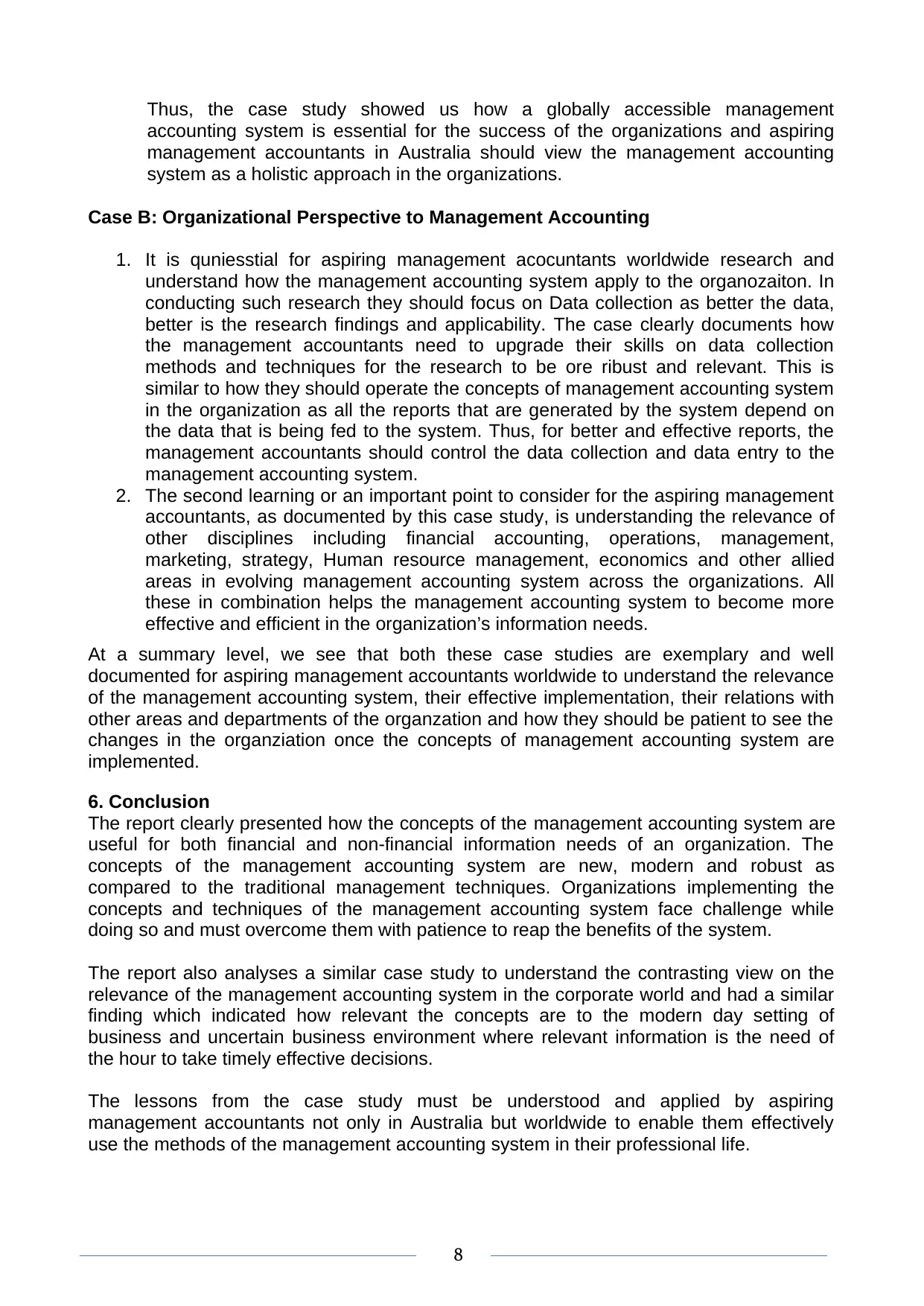
Thus, the case study showed us how a globally accessible management
accounting system is essential for the success of the organizations and aspiring
management accountants in Australia should view the management accounting
system as a holistic approach in the organizations.
Case B: Organizational Perspective to Management Accounting
1. It is quniesstial for aspiring management acocuntants worldwide research and
understand how the management accounting system apply to the organozaiton. In
conducting such research they should focus on Data collection as better the data,
better is the research findings and applicability. The case clearly documents how
the management accountants need to upgrade their skills on data collection
methods and techniques for the research to be ore ribust and relevant. This is
similar to how they should operate the concepts of management accounting system
in the organization as all the reports that are generated by the system depend on
the data that is being fed to the system. Thus, for better and effective reports, the
management accountants should control the data collection and data entry to the
management accounting system.
2. The second learning or an important point to consider for the aspiring management
accountants, as documented by this case study, is understanding the relevance of
other disciplines including financial accounting, operations, management,
marketing, strategy, Human resource management, economics and other allied
areas in evolving management accounting system across the organizations. All
these in combination helps the management accounting system to become more
effective and efficient in the organization’s information needs.
At a summary level, we see that both these case studies are exemplary and well
documented for aspiring management accountants worldwide to understand the relevance
of the management accounting system, their effective implementation, their relations with
other areas and departments of the organzation and how they should be patient to see the
changes in the organziation once the concepts of management accounting system are
implemented.
6. Conclusion
The report clearly presented how the concepts of the management accounting system are
useful for both financial and non-financial information needs of an organization. The
concepts of the management accounting system are new, modern and robust as
compared to the traditional management techniques. Organizations implementing the
concepts and techniques of the management accounting system face challenge while
doing so and must overcome them with patience to reap the benefits of the system.
The report also analyses a similar case study to understand the contrasting view on the
relevance of the management accounting system in the corporate world and had a similar
finding which indicated how relevant the concepts are to the modern day setting of
business and uncertain business environment where relevant information is the need of
the hour to take timely effective decisions.
The lessons from the case study must be understood and applied by aspiring
management accountants not only in Australia but worldwide to enable them effectively
use the methods of the management accounting system in their professional life.
8
accounting system is essential for the success of the organizations and aspiring
management accountants in Australia should view the management accounting
system as a holistic approach in the organizations.
Case B: Organizational Perspective to Management Accounting
1. It is quniesstial for aspiring management acocuntants worldwide research and
understand how the management accounting system apply to the organozaiton. In
conducting such research they should focus on Data collection as better the data,
better is the research findings and applicability. The case clearly documents how
the management accountants need to upgrade their skills on data collection
methods and techniques for the research to be ore ribust and relevant. This is
similar to how they should operate the concepts of management accounting system
in the organization as all the reports that are generated by the system depend on
the data that is being fed to the system. Thus, for better and effective reports, the
management accountants should control the data collection and data entry to the
management accounting system.
2. The second learning or an important point to consider for the aspiring management
accountants, as documented by this case study, is understanding the relevance of
other disciplines including financial accounting, operations, management,
marketing, strategy, Human resource management, economics and other allied
areas in evolving management accounting system across the organizations. All
these in combination helps the management accounting system to become more
effective and efficient in the organization’s information needs.
At a summary level, we see that both these case studies are exemplary and well
documented for aspiring management accountants worldwide to understand the relevance
of the management accounting system, their effective implementation, their relations with
other areas and departments of the organzation and how they should be patient to see the
changes in the organziation once the concepts of management accounting system are
implemented.
6. Conclusion
The report clearly presented how the concepts of the management accounting system are
useful for both financial and non-financial information needs of an organization. The
concepts of the management accounting system are new, modern and robust as
compared to the traditional management techniques. Organizations implementing the
concepts and techniques of the management accounting system face challenge while
doing so and must overcome them with patience to reap the benefits of the system.
The report also analyses a similar case study to understand the contrasting view on the
relevance of the management accounting system in the corporate world and had a similar
finding which indicated how relevant the concepts are to the modern day setting of
business and uncertain business environment where relevant information is the need of
the hour to take timely effective decisions.
The lessons from the case study must be understood and applied by aspiring
management accountants not only in Australia but worldwide to enable them effectively
use the methods of the management accounting system in their professional life.
8
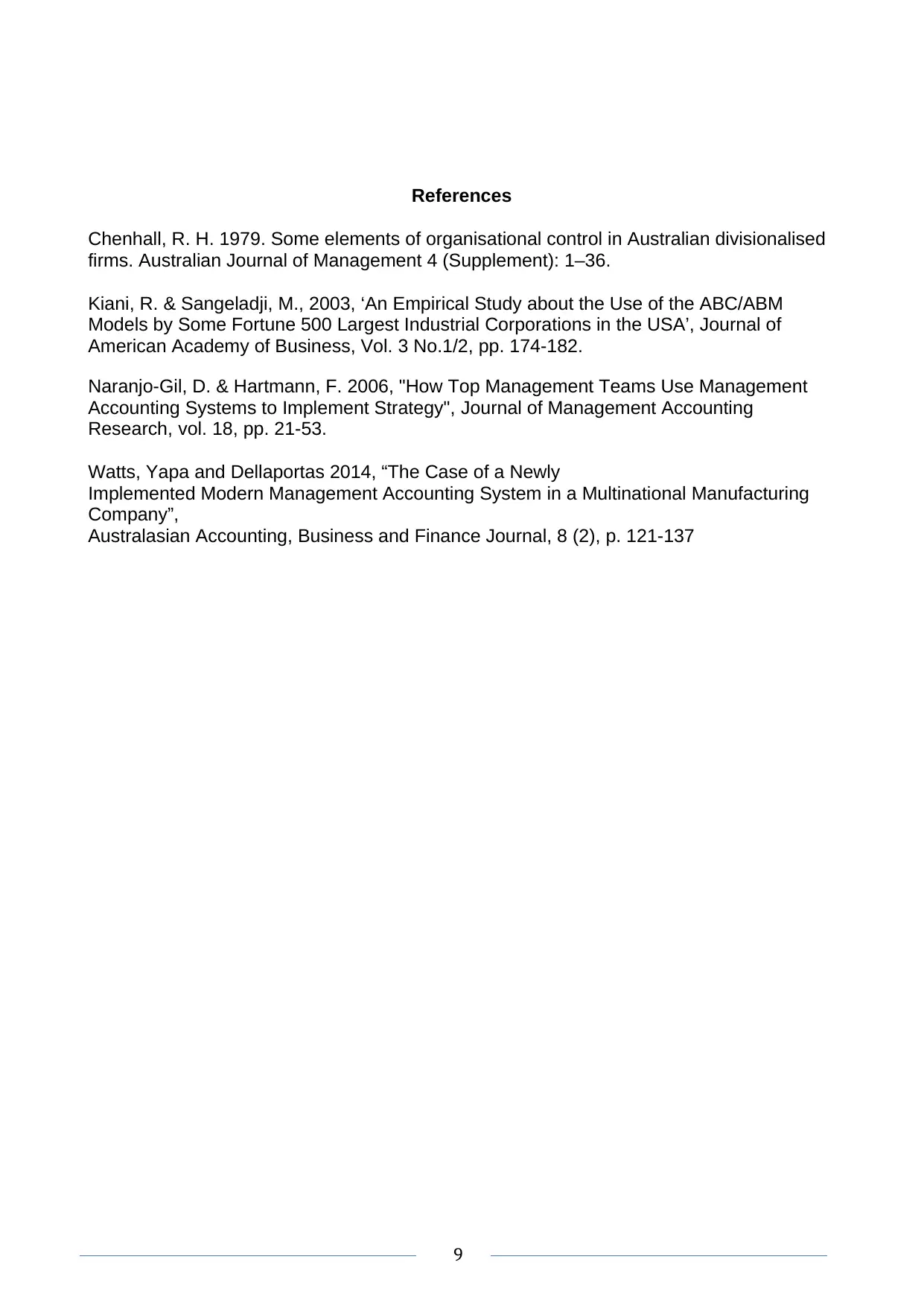
References
Chenhall, R. H. 1979. Some elements of organisational control in Australian divisionalised
firms. Australian Journal of Management 4 (Supplement): 1–36.
Kiani, R. & Sangeladji, M., 2003, ‘An Empirical Study about the Use of the ABC/ABM
Models by Some Fortune 500 Largest Industrial Corporations in the USA’, Journal of
American Academy of Business, Vol. 3 No.1/2, pp. 174-182.
Naranjo-Gil, D. & Hartmann, F. 2006, "How Top Management Teams Use Management
Accounting Systems to Implement Strategy", Journal of Management Accounting
Research, vol. 18, pp. 21-53.
Watts, Yapa and Dellaportas 2014, “The Case of a Newly
Implemented Modern Management Accounting System in a Multinational Manufacturing
Company”,
Australasian Accounting, Business and Finance Journal, 8 (2), p. 121-137
9
Chenhall, R. H. 1979. Some elements of organisational control in Australian divisionalised
firms. Australian Journal of Management 4 (Supplement): 1–36.
Kiani, R. & Sangeladji, M., 2003, ‘An Empirical Study about the Use of the ABC/ABM
Models by Some Fortune 500 Largest Industrial Corporations in the USA’, Journal of
American Academy of Business, Vol. 3 No.1/2, pp. 174-182.
Naranjo-Gil, D. & Hartmann, F. 2006, "How Top Management Teams Use Management
Accounting Systems to Implement Strategy", Journal of Management Accounting
Research, vol. 18, pp. 21-53.
Watts, Yapa and Dellaportas 2014, “The Case of a Newly
Implemented Modern Management Accounting System in a Multinational Manufacturing
Company”,
Australasian Accounting, Business and Finance Journal, 8 (2), p. 121-137
9
⊘ This is a preview!⊘
Do you want full access?
Subscribe today to unlock all pages.

Trusted by 1+ million students worldwide
1 out of 9
Related Documents
Your All-in-One AI-Powered Toolkit for Academic Success.
+13062052269
info@desklib.com
Available 24*7 on WhatsApp / Email
![[object Object]](/_next/static/media/star-bottom.7253800d.svg)
Unlock your academic potential
Copyright © 2020–2026 A2Z Services. All Rights Reserved. Developed and managed by ZUCOL.





